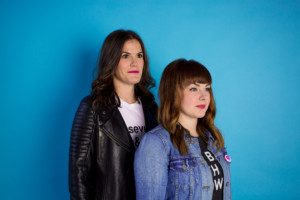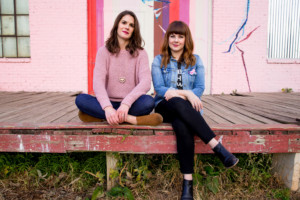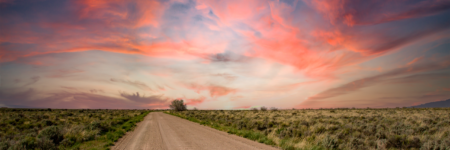If you’ve never laughed out loud while pondering how to smash the patriarchy, you’ve probably never listened to Unladylike. Since 2018, co-hosts Cristen Conger and Caroline Ervin have treated listeners to entertaining episodes exploring pop culture, health, beauty, politics, and more through a feminist lens.
The women behind the podcast are a mix of cool-aunt-meets-engaging-gender-studies-professor. And just like your favorite relatives and teachers, it’s obvious they care deeply about both you, the listener, and the subject matter. But if caring were enough to make a podcast that is hilarious and informative, wouldn’t everyone be doing it? I talked to Ervin and Conger to find out how they manage to make feminist journalism so funny and engaging.

It helps that Unladylike wasn’t their first foray into podcasting—or working together. They both wrote for the University of Georgia’s Red and Black student newspaper as journalism majors. After graduating in 2006, both worked in media at separate outlets honing the skills they’d rely on to create Unladylike. They reconnected in 2011 to work together on the podcast Stuff Mom Never Told You.
They’ve always worked well as a team, in part because they have fun together whether or not they’re in the recording studio.“I can say that Cristen genuinely just cracks me up all the time,” says Ervin. “We recorded a Patreon episode this morning, and I had to stop and take a breath because I literally told her, you’re making me old-man-laugh.” Conger doesn’t take Ervin’s glee for granted. “Caroline has such a great laugh,” she shares, adding that her “joyful cackle is my reward.”
They don’t just amuse each other. Ervin won her high school’s award for wittiest student. And despite feeling “awkward” about saying she’s funny, Conger admits to feeling a sense of validation anytime she can make someone laugh.
Part of what makes the show engaging is the hosts’ self-deprecating sense of humor. During episode development, their editor Gianna Palmer asks why they’re interested in a particular topic. According to Conger, “that often prompts these moments of sharing and vulnerability.”
In “How to Get Botox,” Conger says, “Unless we’re Alicia Keys, folks will openly comment about how sick and tired we look if we show up to work or a date without makeup on.” Later in the episode, she talks about the way posting selfies to social media has affected her self-image. She describes the anguish of wondering why she looks drastically younger in a selfie she’d taken just a year prior. “I was kind of in a mental spiral over like, ‘Oh my God, how do I look like I’m 8,000 years old now?’” She describes feeling terrible about her reflection. “And then I remembered, like, ‘Oh, Cristen, you airbrush your face before you post it.’”
And although Conger says much of their humor “comes out organically thanks to the sheer amount of time—10-plus years,” they’ve been podcasting together, they’ve learned that spontaneity has its downsides. She describes an episode from season one: “The episode was about women, bicycling, and street harassment, and I joked that telling catcallers you have an STD could be one way to shut them up. A listener who has herpes wrote in to tell us how disappointed she was to hear that remark because the stigma and joke-making of STDs is often more painful than the physical symptoms.” Conger added that the listener is right. Since then they’ve been extra careful about “punching up instead of punching down with our humor.” (Meanwhile, that listener’s email was the catalyst for one of their most popular episodes: “How to Fall in Love with Herpes.”)
Educating listeners (while keeping them engaged)
Although humor helps make the show engaging, Conger’s and Ervin’s primary goal is to educate, not entertain. While their planning process depends on the style of the episode, they almost always start with the same question: What is the audience looking for?
They felt it was important to keep, “surprising [listeners] throughout the episode and building layers of ‘did you know this and this and that?’”
They answer not just the questions they’re personally curious about but also the ones their listeners are likely to be asking, whether the subject is “crisis pregnancy centers or the Equal Rights Amendment, or something as superficial as the history of rom-coms.”
How much background information they share with the audience depends on the specific content of each episode. For example, Conger describes their two-part series on abortion clinics, covering TRAP laws and crisis pregnancy centers, as being “very research-heavy… diving into topics that would be brand-new for a lot of listeners.” With these episodes, they sought to strike a balance between giving listeners enough background to understand the issues without overwhelming them with a firehose of information. Meanwhile, to keep the audience engaged, they felt it was important to keep, “surprising [listeners] throughout the episode and building layers of ‘did you know this and this and that?’”
Offering an intersectional perspective
Their process is also driven by a desire to create an intersectional show. The show’s name, says Conger “is our middle finger to white feminism,” since “the very idea of being a lady is in its historical origin racist and classist and ableist.” They aim to highlight angles that receive limited media coverage and narratives that “are often lost or erased,” by being intentional about the stories they tell and the guests they feature, says Conger.
A June 2020 episode, “How Not To Be a Karen,” featured an interview with Mikki Kendall, author of Hood Feminism. In it, Kendall explains that racism has kept feminism from being inclusive of all women, and while women of color have long challenged this issue, “White women are not challenging each other enough.” Ervin then explains to listeners what “white feminism” means, and rather than distancing herself from this problematic brand of activism, she positions herself within it: “It’s when feminists who are white—and often middle-class—prioritize our comfort and concerns while speaking on behalf of ‘all’ women.”
A match made in podcast heaven
The final product represents the unique but complementary obsessions each member of the duo brings to the table. While they’re both feminism geeks, Ervin is a self-proclaimed “research-addicted nerd” and Conger says her “obsessive tendencies kick in more on the scripting side.”
It’s not unusual for Ervin to bring 16 pages of notes to a pitch meeting with the production team. She says her tendency to “over research” is born of a “deep desperate fear of being unprepared,” but is quick to add, “this is not a therapy session.” Although she acknowledges she may always want to know more about a topic, if only for herself, she’s getting better about pulling the plug at a certain point, knowing “you can always go back to Google” if necessary.
As for Conger, she’s prone to asking her co-host, “Am I being too nitpicky?” while revising the script. “I will edit something into the ground,” she says. She knows the final draft is complete when she reads it and can see herself as a listener with no further follow-up questions. Until she reaches that point, she says, “When I do have a question mark, I can usually hop over to Caroline’s very detailed and thorough notes and find the answer.”

Unladylike is currently one of the top ten philosophy podcasts in the United States, a testament both to the show’s loyal audience and savvy marketing decisions. In the Society and Culture category, where the competition includes shows like This American Life and Brene Brown’s Unlocking Us, it ranks in the top 200. While all of the top five philosophy podcasts are also listed under society and culture, the inverse is not true.
Unladylike asks questions about everything from getting Botox to going braless. Their questions all stem from the same place: what Ervin calls “our natural curiosity and desire to know more.” What it takes to bring the answers to light is more nebulous, combining a professorial passion for the art of being unladylike, a sharp sense of humor, and a desire to share both with each other and the audience.




Comments